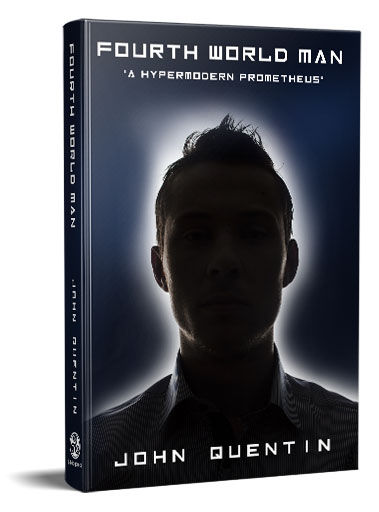John Quentin’s stunning debut novel, Fourth World Man, is bursting with creative and destructive energy. Its complex, vibrant strands twist, turn and cross-link in a way reminiscent of DNA itself. Packed with hard science, brutal action, savage humour, sensitive introspection, profound philosophy and original vision, it is thrilling, controversial, shocking, outrageous and deeply disturbing.
Henry Bell has more Neanderthal DNA than any other person alive in the last forty-five millennia. This begs two Big Questions: How? and Why?
There may be rational answers to the Big Questions but getting to them seems increasingly likely to reveal something amazing but also immoral, unethical and illegal – and up to now safely hidden. Because somehow, somewhere, somebody or something seems to have usurped or disturbed nature and to have redefined the path that human evolution will take. Henry could be the vanguard of a new phase of Humanity’s development or the harbinger of Humanity’s demise. He wants to be neither but powerful and influential people have other ideas about what purposes he might serve and what uses he may have.
Henry is unique among the world’s billions. To those people who know about him and have an interest in him, it is worth breaking every rule, taking every risk and accepting the consequences to get him and to keep him. As more about him and his background is revealed and realised, the more likely it seems that Henry could be the master key to our future. The struggle to acquire him, the genetic code that defines him and the search for the answers to the Big Questions is a proxy war being fought for the control of human destiny and survival. The outcome of that struggle hangs in the balance. However uncertain Humanity’s future may be, something is beginning to look certain: like Henry himself, it will not be exclusively human.
Fourth World Man proffers a vision of an engineered, altered and precarious human future as prescient as any of the classic offerings in the likes of Mary Shelley’s ‘Frankenstein’, Michael Crichton’s ‘Jurassic Park’, John Wyndham’s ‘The Chrysalids’, Arthur C. Clarke’s ‘2001: A Space Odyssey’, and Aldous Huxley’s ‘Brave New World’. It is a remarkable vision of a Neanderthal Resurrection, but one profoundly different from contemporary, popular takes on the Neanderthal legacy found in the likes of A.G. Riddle’s ‘Atlantis’ trilogy, Robert J. Sawyer’s ‘Neanderthal Parallax’ trilogy, Ron Forsythe’s ‘Neanderthal’, John Darnton’s ‘Neanderthal’ and Claire Cameron’s ‘The Last Neanderthal’. It is unique among them all.
At last, the Neanderthals are portrayed in a new light, free from the misunderstandings, misconceptions and misinformation of the past. At last, the most up-to-date fact, information and opinion is accessible. Fourth World Man reminds us that the majority of modern humans have Neanderthal forebears and suggests that the next evolutionary step humans will take will again depend on a Neanderthal legacy for the hybrid vigour needed for future survival. For a twenty-first century view of the next twenty-one centuries and beyond, Fourth World Man is the definitive, genre redefining ‘must read’ of the millennium.



